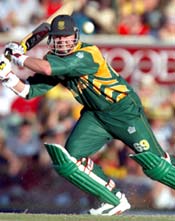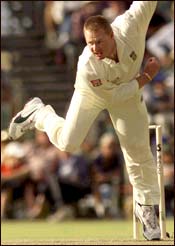Home > Cricket > Column > Gulu Ezekiel
Silencing the assassin
May 28, 2003

If ever there was a cricketer who could be described as the strong, silent type it is Lance Klusener. Shivnarine Chanderpaul is perhaps the only international cricketer today who could go one better than Klusener in the silent category -- show him a mike and you can be sure he will be off in a jiffy. But then Chanderpaul is way behind when it comes to strength.
Legendary fast bowler Jeff Thomson used to describe his bowling style thus: "I just run up and go thwack."
There was no run up of course for Klusener at the batting crease but the ball certainly would go thwack when walloped by one of the heaviest bats in cricket history.
Klusener was one of cricket's last old-style amateurs in the best sense of the word. For him cricket was what it really should be -- just a game. That attitude, it appears, has lost him a place in the South African side despite a wonderful World Cup at home, where he finished second in the South African batting averages, with 91, and fourth in the bowling averages. All this with a batting strike-rate of 118. And remember, the Great White Hope of South African cricket, Jacques Kallis, had a miserable time, both with bat and ball.
Klusener's aversion to the media apparently was one of the factors behind his new captain Graeme Smith's astonishing attack on one of contemporary cricket's most dynamic players. It must hurt when your captain makes disparaging comments about your attitude and lack of team spirit at a business breakfast. And though a man of very few words, Klusener has reacted angrily to the shabby treatment at the hands of the selectors and his captain.
The few words Klusener has been reported uttering in the dressing room have, sadly, backfired on him Watching the chaotic scenes at the end of tied 1999 World Cup semi-final at Edgbaston, I was astonished to see the man who had taken his side to the brink of an unlikely victory with another barnstorming innings (31not out from 16 balls) simply peel off his gloves and walk straight back to the pavilion, head unbowed.
In his wake the Aussies were going berserk with joy, as the tie had guaranteed their entry into the final while last-man Allan Donald, who had frozen at the crease at the crucial moment, looked utterly shattered.
"Nobody died," were Klusener's seemingly callous words at the end of it all as his teammates slumped in despair all around him. He was right, of course, though perhaps the timing was not quite right. Hosts and joint-favourites South Africa once again saw their chances crushed by a tie, this time self-inflicted, in their final group game against Sri Lanka at Durban last March. Once again it was Klusener who was at the crease at the end, brought about by rain. This time, though for some unknown reason, he had calmly pushed back seven of the eight deliveries he had faced for his solitary run.
"At least I'll have two extra weeks for fishing," were his words this time around in the dressing room as the nation fell into a pall of gloom.
Brought up by a Zulu nanny with her sons for childhood companions, he has always been a country boy at heart. Growing up near Durban he admitted, in a 1999 interview, shortly after being chosen as Player of the World Cup, that solitude always appealed to him -- something that Smith and coach Graham Ford now hold against this uncomplicated soul. And yes, fishing has been a passion since childhood.

"It's important to get away and be by yourself and have the opportunity not to see anyone or hear anyone for quite a while. It's a nice escape for me." The strength mentioned at the start of this article is not only physical -- three years in the army straight after school would have seen to that. It's also mental, the ability to rescue his side time and again with brutal hitting.
His debut Test, at Kolkata in 1996, showed that side of 'Zulu', though with the ball rather than the bat. In the first innings he took a pasting from captain Mohammad Azharuddin, including five fours in succession, for figures of none for 75 from 14 overs. In the second, he stormed back to grab 8 for 64, bowling South Africa to victory on the back of Gary Kirsten's twin centuries.
I saw another glimpse of that amateur spirit in 2000 when Klusener was in New Delhi for a celebrity golf tournament featuring cricketers from around the world. I decided, rather mischievously, to ask him to sign the ticket I had retained from that 1999 World Cup semi-final. He did so without a moment's hesitation and handing it back to me, said, "Thank you sir," even before I could thank him.
Ever heard a cricketer thank an autograph hunter?
--The writer is a freelance journalist and author based in New Delhi.
More Columns
